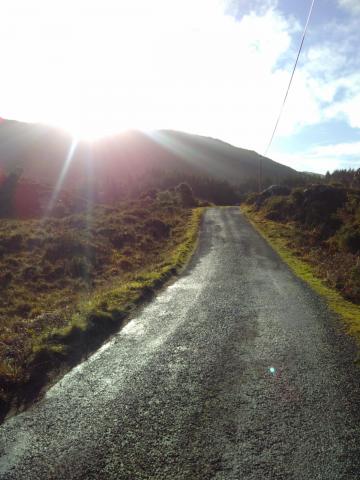
January is a good time to interview Irish dairy farmers: the majority calve in spring so they’re in the middle of a relative lull when milking has stopped before the cows calve. (There are also lingering tins of Christmas biscuits for sit down interviews.) The weather was mercifully mild and I carried out 20 interviews with farmers who very kindly gave up their time for the ‘Cows eat grass, don’t they?’ project in Louth, Meath, Kildare, Cork, Limerick and Kerry. Interviews are exploring the type of systems farmers operate in terms of feeding and housing, their views on other systems, how well post-milk-quota-removal expansion has gone and where they see the dairy industry going. Here’s some personal and professional reflections so far:
- Most people agreed there would be fewer, bigger farms in the future, because of stagnant milk prices and lack of people wanting/able to take over farms, as much as any choices about farm system.
- Farmers I spoke to who couldn’t expand because they couldn’t get land around them were worried about the future of the sub-100 cow family farm.
- Farm dogs are friendlier and less disciplined than you might expect: a lot of jumping up with muddy paws.
- I heard little talk of land going to daughters or nieces.
- There was no one, overarching, cultural attitude towards on-farm debt, it varied a lot: some seeing it as the way to secure a viable and fulfilling future, some pragmatic but wary, some very debt averse because it could compromise their autonomy or even their ownership of their land.
- Roads in Ireland are often better than Scotland? More EU money?
- Irish radio commentators are obsessed with drugs at the moment. There was a spate of grim drug-related gangland killings but talk more widely of the morality of drug use – breaking the law, addiction, funding drug gangs.
- People no longer know I’m Irish, I was coming from a UK institution and the accent must be less clear.
- Some people really love dairy farming and it does seem like shame if they could no longer do it because their farm is too small to be viable in the future.
- The number of cows per one working person varied massively – farmers managing 180 cows by themselves or 80 between 2 people.
- The farmers I spoke to were mostly ‘progressive’ interested farmers and they mostly all knew the key performance indicators they should be working on. In the Irish system you minimise:
- Bought in feed
- Grass cover growing too high before the cows get to it because it gets ‘stemmy’ and less nutritious
- The cows’ size
- The length of time it takes you to calve in spring.
You maximise:
- Milk solids of fat and protein per cow (within limits of bought in feed)
- Grass growth per hectare per year
- The number of cows in the herd within the parameters of available land and labour.
- Farmers I spoke to were less concerned about the environment than I might’ve expected. I asked “What would you like to see happen in relation to the environment?” and many said more recognition of what they’re doing in terms of sequestering carbon in grassland soils rather than change in practice.
- There was some appetite for mixed grass swards and clover use that minimise fertiliser use, pending more research and advice about how to manage them.
- With cups of tea/coffee most of the farmers I spoke to gave me carton milk rather than milk from the bulk tank. One farmer cited TB as the reason.
- West Cork is very beautiful and somehow more hospitable feeling a landscape than the Scottish Highlands.
- There were mixed feelings about spring – the excitement of calving and new life, the milk cheque starting again and letting the cows out to grass. But also the exhaustion of calving and disrupted sleep, and worry about the weather: if it’ll be too wet for the cows to stay on grass.
- A lot of people’s favourite time of the year was late summer: calving and silage cutting is finished, there’s a milk cheque coming in and the weather might be nice.
I’ve returned to the UK to finish interviewing farmers there and start the lengthy and involved process of analysing the interviews.